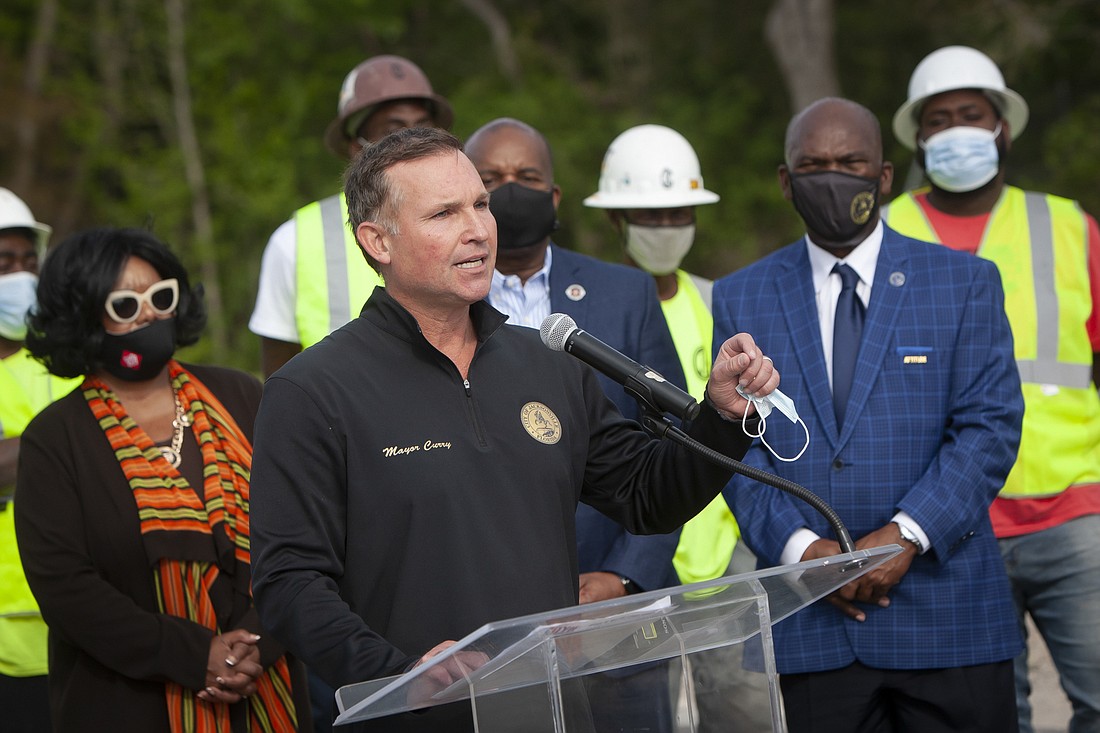
City and Jacksonville Transportation Authority officials began a public campaign March 18 to extend and double Duval County’s local option gas tax to pay for nearly $1 billion in planned and deferred infrastructure projects.
Mayor Lenny Curry was joined by City Council President Tommy Hazouri, JTA CEO Nathaniel Ford and other Council members at a news conference to pitch what Curry calls the Jobs for Jax plan.
Curry said new revenue would free money to pay for long-promised aging septic tank mitigation in some of Jacksonville’s underserved neighborhoods.
“By fully leveraging the gas tax like other major Florida cities do we can make significant progress on improvements to transportation and infrastructure needs throughout our community,” Curry said.
“Over 30 years this source of revenue is expected to raise nearly a billion dollars exclusively used to invest on our infrastructure and create thousands of jobs.”
The news conference was part of Curry’s continued public push to gain support for a 10-year extension of the gas tax to 2046 and an additional 6 cents per gallon to a total of 12 cents.
Curry and Council leaders expect the tax will result in $1 billion in revenue over 25 years. That could free up $300 million to $400 million in the city general fund that the mayor said would be used to “take a substantial bite” out of Duval County’s estimated $2 billion failing septic tank problem.
Curry said March 18 that the increase would bring Duval County’s gas tax in line with the 12-cent tax already employed by neighboring Clay and Nassau counties and most major Florida cities.
A Florida statute allows counties and municipalities to use local option gas tax revenue only for transportation-related infrastructure projects.
Curry argued that tax was equitable because the approximately 96,000 daily out-of-county commuters also would pay the tax.
“I understand there are people who are philosophically opposed to taxes no matter what, and I respect that position. But you fund projects with tax dollars. It’s time we get stuff down and we get it done now,” Curry said.
The news conference was at the site of JTA’s Collins Road mobility project.
That project is part of nearly $175 million in roadwork under construction or completed by JTA and paid for through the last gas tax extension in 2014.
Ford used the backdrop as proof the city and JTA could execute the $930.2 million in projects officials want to fund through the gas tax increase and extension.
That preliminary list includes about $483 million for road, bridge and curb and gutter repairs and $102 million for 3,682 miles of countywide road resurfacing.
For JTA, the biggest spending would be $371.96 million for two projects to rehabilitate, expand and retrofit the Downtown Skyway.
The money would pay to adapt the elevated monorail track to support the automated vehicles in JTA’s Ultimate Urban Circulator.
The gas tax revenue also would allow JTA to expand the Skyway to Riverside and Five Points, Springfield, UF Health Jacksonville and Jacksonville’s Southside medical complex corridor.
The preliminary project chart released last week by JTA shows $34.71 million to bring 823 bus stops in Duval County into compliance with the Americans with Disabilities Act. Another $13.87 million would improve 111 bus stops in Northwest Jacksonville.
Ford said the tax’s projected revenue is “on the conservative side,” and JTA has worked with the Curry administration to determine the estimate.
Ford told reporters those estimates took into account the expansion of fuel efficiency and electric cars over the next 30 years.
“It’s probably the last opportunity to leverage the gas tax for these types of projects,” Ford said.
Hazouri, as well as Council Vice President Sam Newby, a Republican, and members Brenda Priestly Jackson and Ju’Coby Pittman, both Democrats, endorsed Curry’s proposal March 18.
Curry and Hazouri did not give a firm timeline for getting the legislation to a final Council vote, but the mayor said his administration will be meeting individually with all 19 city legislators to answer questions and finalize a list of projects.
Curry said the infrastructure work would begin in October in the 2021-22 fiscal year.
“We’re doubling down and we’re talking big-time projects that have been long past due as the mayor is indicated,” Hazouri said.
“This coupled with what the school board’s doing with their $2 billion in building schools and renovating, you’re going to see a lot of workers out here ... local contractors, local workers.”
“That means more for the economy that means more for our health, safety and welfare when these projects are completed,” Hazouri said.
The city and JTA launched a website about the proposal at jobsforjax.net.